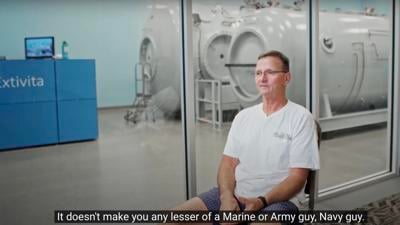
A veteran, in this screenshot from a YouTube video posted by Extivita, talks about the success of hyperbaric oxygen therapy. Extivita | Screenshot of veterans’ montage
(The Center Square) – The Department of Veterans Affairs estimates 17 U.S. military veterans commit suicide each day.
Other research from America’s Warrior Partnership conducted by the University of Alabama and Duke University suggests that figure could be as high as 44 per day, when accidental or undetermined self-injuries, such as drug overdoses, are included.
Still others have more estimates.
Regardless of the exact number, the rate is staggeringly higher than the civilian population, and it’s “just unacceptable,” U.S. Rep. Greg Murphy, the only practicing physician among 19 in Congress, told The Center Square.
The situation is fueled largely by veterans with post-traumatic stress disorder and traumatic brain injuries, has persisted for decades. Murphy reintroduced the Veterans’ National Traumatic Injury Treatment Act to establish a pilot program at the Veterans Administration to furnish hyperbaric oxygen therapy for veterans with TBI and PTSD.
The therapy, known as HBOT, involves 40 to 80 treatments with 100% oxygen under two atmospheres of pressure in hypobaric chambers. The pressure drives the pure oxygen, an essential element for healing, into areas of the brain that have lost blood flow, working to regenerate and heal injured tissue.
“I’ve been a physician close to 35 years now and a surgeon, and I’ve used hypobaric treatment for years,” Murphy said. “It’s an excellent therapy for helping wounds heal.”
The therapy, however, is not approved for use by the VA, which classifies PTSD and TBI as mental illness rather than an injury. The course of treatment involves counseling and drugs, including many that warn of suicidal ideation.
Murphy introduced the same legislation in the 116th and 117th Congresses, but despite support from numerous veterans’ groups it has never advanced out of the House Veterans’ Affairs Committee. Murphy’s predecessor, the late Walter Jones, pursued similar efforts that resulted in HBOT studies that complicate the issue.
The research relied on a now-outdated definition of HBOT at 1.4 atmospheres of pressure or above, rather than the revised definition of any pressure above 1 atmosphere, and attributed positive results at lower pressures to placebo.
Jim Hooker and others worked with Murphy during the congressman’s tenure as a state representative to launch a North Carolina HBOT for Vets program in 2019, securing $150,000 in 2021 to help fund treatments for 21 veterans. The General Assembly approved an additional $100,000 in 2022 to treat another 15. This year, Hooker is working to expand the program to thousands through a pending request for $1 million in the upcoming state budget.
The results, Hooker said, speak for themselves, with veteran testimonials about the “complete change” they’ve witnessed in their lives. Similar efforts are healing veterans in 10 other states, as well.
“This works and the evidence is getting compelling,” Hooker said. “In the next couple of years we’re going to have thousands successfully treated with oxygen therapy in this state.”
Hooker argues the treatment’s potential benefit for taxpayers is staggering, with the current lifetime of drugs running into the millions per patient, compared to $5,000 to $10,000 per patient for oxygen therapy. Those figures, he noted, don’t include lost productivity from sidelined vets who cannot work because of their injuries, and the public benefits to support them.
Robert Beckman worked in military intelligence for the Department of Defense studying PTSD and TBI for years before forming TreatNOW, a nonprofit that helps to coordinate HBOT treatments for veterans and research at more than 140 clinics across the U.S. Over the last 14 years, those clinics have successfully treated more than 21,000 with PTSD, TBI and other injuries, including more than 7,500 veterans.
“Virtually everyone who goes through full HBOT gets off 80% to 100% of their drugs,” he said. Clinics across the country “are stopping suicides and giving them their lives back, and the VA denies it’s happening.”
Both Hooker and Beckman believe resistance to expand HBOT at the VA and in Congress stems from pharmaceutical companies and a research industry that’s invested in treating the symptoms of PTSD and TBI, despite a suicide rate that’s remained largely unchanged for two decades.
They question hundreds of millions in tax dollars spent on suicide prevention campaigns that have failed to substantially move the needle, and suggest the funds would be better spent to address the root cause. The lives of nearly 900,000 veterans with brain injuries from over two decades of war in Iraq and Afghanistan hang in the balance.
Neither are optimistic the situation will change in the short term. They want the federal government to provide emergency authorization for HBOT for veterans, like vaccines for COVID-19.
Murphy rejects there’s any “conspiracy from pharmaceutical companies,” and is “cautiously optimistic” the Veterans’ National Traumatic Injury Treatment Act will receive a hearing this session.
“I don’t see any evidence” drug companies are influencing the process, he said. “If you look back the last 20 years, you can see there’s some studies that pushed back on it.”
“I think we’re (Republicans) are in the majority, and I’m on the (House’s VA) health subcommittee, so I’m going to try to push it forward,” he said. “I think it’s just a matter of time until it gets heard.”
Cited from The Center Square
